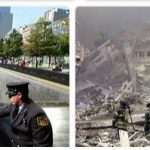5: Critics of “War on Terror”
There were some critics. One of the critics was the famous scientist John Mearsheimer . Mearsheimer’s critique was based on American self-interest. The US military is completely superior to other states, he said. Why then waste a lot of resources that could rather be used elsewhere. Why spend the resources on something that could not possibly be a central national interest?
In 2011, when the war in Iraq has claimed many lives and alone has cost – measured in dollars – the Americans more than the war in Vietnam, and it seems quite unclear what the gain has been, there are probably many more who ask the question of national interest. But when it came down to it, Mearsheimer and a few other skeptics stood alone. In Europe, many wondered if al-Qaeda was worth a duel for the world’s sovereign strongest state. Would not a police action have been a considerably more proportionate reaction (more adapted to the attack on 11.09) and much better suited?
That question stands. Others have joined. The dominant question now is how the international community, led by the United States, will be able to withdraw at the least possible cost, not least for the honor bill. However, the question seems to be primarily technical-political. That is, as a question of practical withdrawal, as opposed to, for example, a moral, philosophical or strategic question. There has been no strong generational opposition or social unrest, in line with what followed the Vietnam War.
6: International reactions
Outside the United States, it’s different. The war in Afghanistan and Iraq, along with police operations elsewhere, especially in Islamic countries, has cost the United States dearly . Both economically and politically. The country has managed to maintain the crucial alliance with Saudi Arabia. At least officially, the United States has also maintained an employment relationship with Pakistan. But in the last ten years, the United States has become even less popular with most people in the Middle East.
When it comes to people in the Middle East, there is even more reason today for Americans to ask “Why do they hate us?” now than it was in 2001. As the United States chose to define its relationship with radical Islam as war, it led to ripple effects throughout Christianity and throughout the Islamic world. Security thinking spread to ever new areas. Here in Norway, too, we must obtain more technically advanced passports, and we must do so more often. The queues at the airports have become longer. Cross-border travel is slower.
Among other things, the use of language was also sharpened. Before 11.09. we talked in Norway about «immigrants». Now we’m talking about ‘Muslims. A condition of action for July 22 was the sharp increase in tension between these figures in the previous decade. This general trend cannot be explained by 11.09, but it can also not be thought of in isolation from 11.09.
How has 11.09. influenced America’s place in the world? In general, it seems that 11.09 has first and foremost reinforced and accelerated trends that were already there. Seen from Europe, the United States under the Texan Bush appeared more and more unrecognizable – where had the traditional elite, the formative bourgeoisie from New England, gone? Seen from the United States, this geographical shift was only a continuation of the shift to the south and west that began under California President Ronald Reagan.
America’s shift in interests the last decades away from Europe and towards Asia have been marked. For the United States, therefore, it does not mean the whole world that NATO is weakened. The underlying tensions between the United States and other central powers – primarily China and India – have become more visible. These two states were dissatisfied with their power-political influence before 11.09. After ten years of further growth, they are today even more dissatisfied. Nevertheless, the United States remains by far the strongest military power in the world and will remain so for some years to come.
7: Human rights – how credible is the United States?
The most important effect of 11.09 is related to the polarization towards Muslims and the relationship with China and India. But the effect is of a more general nature. Following the United States’ conduct at Guantanamo Bay (US base in Cuba) and at Abu Ghraib (Baghdad prison), it is more difficult for Americans to speak and argue credibly from a human rights perspective . After the failed wars in Afghanistan and Iraq, it is more difficult with credibility to claim that the US political and economic system can be exported – at least not by force. Together with increasingly stronger China and India, this means that the West’s advantage in global politics has been significantly weakened .
In the 1990s, many spoke of “the end of history.” The future of the world would be a single long victory march for the West’s economic and political models, it was said at the time. It became commonplace to say that the United States was the strongest imperial power the world had ever seen . That kind of triumphalism (after the Cold War was won) has been silenced. Today, almost everyone believes that the future is multipolar. The state system will have more poles than the United States, a country located in North America according to Transporthint.
In retrospect, the war on terror may emerge as an important stage in the dismantling of Western hegemony . 11.09 was a terrible tragedy. The war on terror was a failed reaction.








